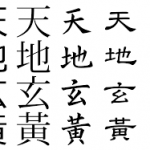By Sarah-Claire Jordan
 Hong Kong has long had a culture distinct from that of mainland China, but something has happened recently that has made something come bubbling up to the surface. On a Hong Kong news channel, TVB, subtitles for a news show in Mandarin Chinese were not in the usual traditional Chinese and were instead simplified Chinese.
Hong Kong has long had a culture distinct from that of mainland China, but something has happened recently that has made something come bubbling up to the surface. On a Hong Kong news channel, TVB, subtitles for a news show in Mandarin Chinese were not in the usual traditional Chinese and were instead simplified Chinese.
This may seem innocuous to outsiders, but it has caused quite a lot of controversy and debate in the autonomous territory. The issue is that simplified Chinese, the writing system used in most of mainland China, is not used in Hong Kong. It is something that is part of the mainland China identity, as with the Mandarin language. Hong Kong is a primarily Cantonese-speaking area, where the traditional Chinese writing system is still used as well.
Debates over language hardly ever have their roots in purely linguistic differences. Hong Kong has only been a special administrative region of China since 1997, and before then it was under British rule beginning in 1842, with a short period of Japanese occupation from 1941 to 1945. Hong Kong has not gone through the same things mainland China has, and vice versa.
While many in Hong Kong see simplified Chinese as a result of the movement to eliminate certain traditions in China by the Communist Party’s cultural revolution, that doesn’t necessarily mean that communism created simplified Chinese. In fact, the Chinese writing system started to become more simplified long before any communist parties were stirring up revolutions in China.
Another reason why the traditional Chinese writing system may have needed a makeover was the civil war in China that ended in 1949. Finally, after nearly five decades of turmoil, the Chinese government could sit down and focus on the well-being of its citizens. Looking at ways to increase the literacy rate, and quickly, many realized that it would take much less time for someone to learn to read and write in Chinese if the writing system was simplified a bit more.
This might not be enough to convince some people in Hong Kong that they shouldn’t cause a scene over some subtitles, but they may have very little say in the issue. The number of people who write in simplified Chinese is far greater than that of those who don’t, and this trend is continuing. Even so, only about 50 of the 200 most common characters used have been simplified at this point. Maybe in the future this will change, and the number of modified characters will be higher, but the writing system is currently in no danger of being completely changed.
The lesson here might be more along the lines of “make sure you are expressing what you are actually upset about”. Hong Kong and mainland China have had their differences, and many citizens of Hong Kong sometimes feel that the country that rules over them does not always have their best interests in mind. If that is the case, why not address these issues rather than cause a huge fuss over some easier-to-read subtitles?
For an overview of our translation expertise, visit our media and marketing translation page.



